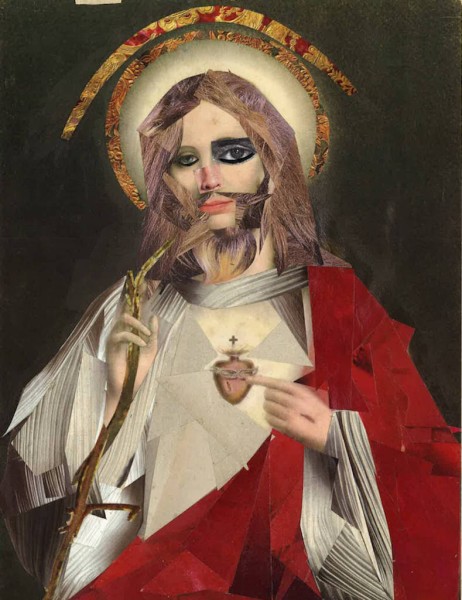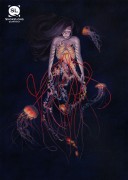Jesus showed up at the county fair and started kissing babies. And people offered up their babies freely, joyfully, willfully forgetting that this man was not Jesus, because (at the very least) why would Jesus put on black eyeliner? Why would he draw little black tears near his eyes?
The whole town decided to give him a pass. I think it was because of all the bad things that had just happened (were always just happening) in the world. Everyone was still a little raw. They were hungry for kindness, and they wanted to believe in the easy way he offered it up. So they thought: what’s the harm in letting him wander around, with his soft hands and long hugs and surprisingly limited knowledge of biblical verses? Where’s the harm in all of that?
He did have boundaries. He said he would pray for us, but he did not pretend to heal anyone. He did not attempt to raise Sergeant from the dead, even though Jamie asked the way his mom had taught him, saying please and thank you and sir. Sir Jesus would you please raise my dog Sergeant from the dead? He was a very good dog thank you.
He carried a knobby walking stick that still had twigs and buds and leaves sticking off of it. It was more like a walking branch. He said he needed it because he walked everywhere. He liked to walk because that’s how the real Jesus got around, other than a camel, and he did not have access to a camel. What about a horse? Not the same, Jesus said. Of course. Horses and camels are not interchangeable.
The summer Jesus came the air conditioner broke and my mother said, I know something fun we can do. We can think of other ways to keep cool. How about we get out the hose and spray each other? How about we wet facecloths and press them to our faces? How about we drop ice underneath our shirts and down our backs? But it was all because we could not afford a new air conditioner.
My brother and I said what about Water Wiz? Can we go to Water Wiz? That is another way to keep cool. We dreamed of the chlorine sting of the cool water, our bare feet padding on the hot cement, the rubber of inner tubes against our thighs as we bounced and swished down the looping slides.
Maybe, she said. But when she said this she sounded deflated.
We left her and sat on the porch. We took an ice cube tray from the freezer with us and filled our mouths with ice cubes and spit them at each other.
Our house was on Jesus’s path, and that afternoon he stopped in front to adjust one of the Velcro straps on his Tevas. The Velcro made that scrunching sound, the sound of the million little eyes and hooks latching and unlatching. He was about to carry on, but my brother said why are you pretending to be Jesus?
Jesus smiled and knelt down to our level. He looked the way Jesus always did in the biblical coloring books from when we used to go to Sunday school: crouching, arms wide open, but without the usual garden, without the usual children climbing his shoulders or sitting by his feet.
Did someone hire you? I asked. Are you like the Jesus version of a mall Santa or something?
No, he said. His voice was soft like his hands. No, I’m not.
We chatted for a while. I asked him what it was like to be Jesus and he asked me what it was like to be in middle school. My brother asked him if he’d ever been to Water Wiz. Once my brother started talking he did not stop. He told Jesus our entire life story, almost, and then Jesus took out his wallet.
He gave me the money, because I was older. I was going into the sixth grade and was practically an adult. For a second, I was afraid he would ask for something, like for me to swear I would have faith in him, forever, or for me to kiss him with tongue, or for me to preach on his behalf, or join a nunnery. But he only handed me the cash and went on his way: fifty dollars so my brother and I could go to the waterpark.
When I gave it to my mother and told her where it came from and what it was for, she sighed and shook her head and said, what am I supposed to do with this? She is not a religious person, but it was very clear she was not asking us, and was possibly seeking some kind of higher guidance.
In the end she used it to pay the electric bill. It was enough to hold them off for another month. For days afterward, she said, be sure to thank Jesus for the lights, be thankful you can see when the sun goes down, be thankful that the milk in the fridge has not turned sour. Thank Jesus! I could tell she was pleased with herself, amused, but underneath the humor was relief, a kind of crushing relief I had never seen before, so real it was physical.



 The core workshop of SmokeLong Fitness is all in writing, so you can take part from anywhere at anytime. We are excited about creating a supportive, consistent and structured environment for flash writers to work on their craft in a community. We are thrilled and proud to say that our workshop participants have won, placed, or been listed in every major flash competition. Community works.
The core workshop of SmokeLong Fitness is all in writing, so you can take part from anywhere at anytime. We are excited about creating a supportive, consistent and structured environment for flash writers to work on their craft in a community. We are thrilled and proud to say that our workshop participants have won, placed, or been listed in every major flash competition. Community works.